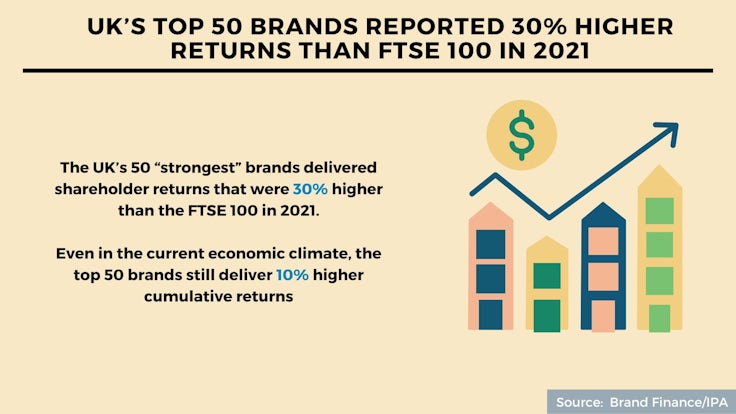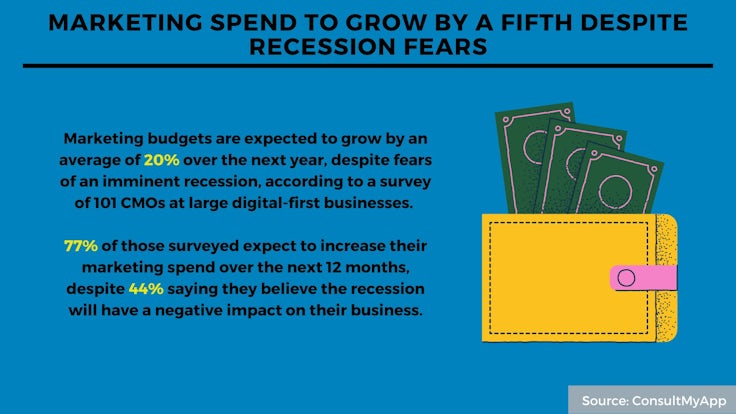Marketing budgets, Christmas spending, personal data: 5 interesting stats to start your week
We arm you with all the numbers you need to tackle the week ahead.
Marketing spend to grow by a fifth despite recession fears
Marketing budgets are expected to grow by an average of 20% over the next year, despite fears of an imminent recession, according to a survey of 101 CMOs at large digital-first businesses.
More than three quarters (77%) of those surveyed expect to increase their marketing spend over the next 12 months, despite 44% saying they believe the recession will have a negative impact on their business.
Brand building is the area of marketing that will see most investment over the next year, with 42% of CMOs planning to invest in brand. The next biggest areas of spend are in new services (42%) and traditional advertising (41%).
More than half (52%) of the CMOs surveyed say they will look to agencies for support, while 36% plan to hire internally instead.
In particular, CMOs say they will need agency support in areas like marketing platform implementation and migration (32%), digital strategy and consulting services (32%), and search engine optimisation (31%).
Source: ConsultMyApp
A third of consumers say inflation will have a major impact on Christmas shopping
 Over one third (34%) of British consumers say inflation will have a ‘major’ impact on their Christmas shopping spend.
Over one third (34%) of British consumers say inflation will have a ‘major’ impact on their Christmas shopping spend.
Only one in 10 consumers claim inflation will not affect their Christmas spending at all, with 32% estimating it will have a ‘moderate’ impact and 18% saying it will have a ‘minor’ impact. Almost two-thirds of those surveyed state they are ‘very’ or ‘fairly’ worried about the impact of inflation on holiday shopping.
Four in five of concerned holiday shoppers say they will likely be buying fewer items this year, and a similar number saying they will be looking to buy items that are on sale and discounted. One third will be shopping with brands or retailers they don’t typically buy from.
The survey suggests retailers and brands need to be thinking about the festive season already, with almost half (49%) of concerned holiday shoppers saying they are likely to start shopping before November. More than a third (34%) also say they will turn to second-hand items this Christmas.
Most concerned shoppers (89%) will be doing their shopping both in-store and online. This group say free returns (63%) and free delivery (55%) are essential components of their holiday shopping this year.
Source: YouGov
Only one in 10 consumers trust media companies to keep data safe
 Only 12% of consumers trust media and entertainment companies to keep their personal data safe, according to a survey of 21,000 consumers worldwide.
Only 12% of consumers trust media and entertainment companies to keep their personal data safe, according to a survey of 21,000 consumers worldwide.
Media and entertainment organisations are least trusted, followed by government (14%) and social media firms (18%). The most trusted organisations to keep data safe are in banking and finance (42%), healthcare (37%), and consumer technology (32%).
In the UK specifically, there is low trust in social media companies. Some 14% of UK respondents say they have no trust at all in social media brands. A majority of British consumers (55%) say they are increasingly worried about personal data held by social media brands. Over a third (35%) say they have already taken or will take steps to protect their social media data.
Worldwide, a fifth (21%) of those surveyed say they have stopped using a company that has suffered a data breach. More than half (54%) believe companies should have to introduce better data security measures after a breach, with a similar number (53%) believing companies should compensate consumers affected. However, the lowest priority from customers when a data breach occurs is for regulators to impose large fines on the company, with less than a third (31%) believing this is necessary.
The figures come from the 2022 Thales Consumer Digital Trust Index conducted by Opinium in partnership with the University of Warwick.
Thales executive vice president, digital identity and security Philippe Vallée says the research demonstrates that customers recognise the “risk and reward” involved with their own cybersecurity.
Source: Thales
Grocery inflation hits new record high
 The average household is facing a £643 jump in their annual supermarket shopping bill – if they continue to buy the same products – as grocery price inflation hits a new peak of 13.9%.
The average household is facing a £643 jump in their annual supermarket shopping bill – if they continue to buy the same products – as grocery price inflation hits a new peak of 13.9%.
This is the highest it has been since Kantar started tracking prices in this way during the 2008 financial crash.
As a result, consumers are looking for ways to reduce costs with supermarket own-labels again seeing a rise in take up, growing 8.1% this month, while branded items declined by 0.7%. Supermarkets’ imperfect ranges, such as Morrisons Naturally Wonky and Tesco Perfectly Imperfect have also seen a boost, collectively up 38% this month.
The latest figures from Kantar show grocery sales rose 4.8% in the 12 weeks to 2 October 2022.
Source: Kantar
UK’s top 50 brands reported 30% higher returns than FTSE 100 in 2021
 The UK’s 50 “strongest” brands delivered shareholder returns that were 30% higher than the FTSE 100 in 2021, according to analysis compiled by Brand Finance and commissioned by the IPA.
The UK’s 50 “strongest” brands delivered shareholder returns that were 30% higher than the FTSE 100 in 2021, according to analysis compiled by Brand Finance and commissioned by the IPA.
Even in the current economic climate, the top 50 brands still deliver 10% higher cumulative returns.
Brand Finance determines the relative strength of brands by evaluating marketing investment, stakeholder equity, and business performance. In 2021, EY ranked as the UK’s strongest brand with a score of 86.9 out of 100, followed by Premier Inn, Lysol, Persil and Dove.
According to the ‘Why brands matter 2022’ report, returns were significantly better for businesses in which their brands make up a higher share of their total value, meaning those that have a high brand value to equity value ratio (BV/EV). These high BV/EV brands delivered 80% higher returns than the FTSE 100 in 2021.
Meanwhile, the impact of a high BV/EV versus the FTSE 100 was strongest in 2013, 2016 and 2019, which are all years which followed a financial downturn.
Source: Brand Finance/IPA









Comments